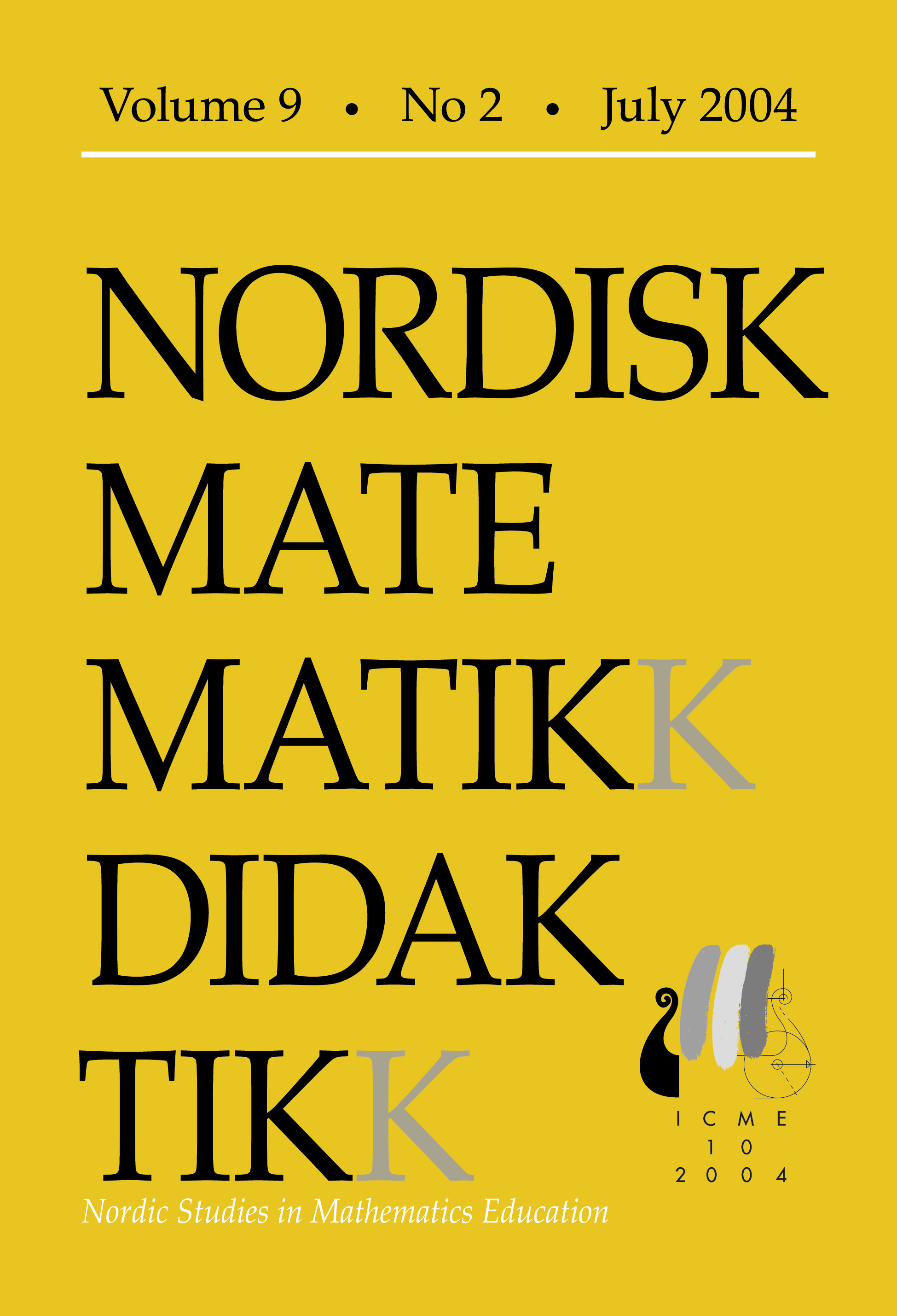Dialogic learning in collaborative investigation
DOI:
https://doi.org/10.7146/nomad.v9i2.147119Abstract
This article claims that the quality of classroom communication influences the quality of learning. A dialogue can be seen as a conversation with certain qualities: it is a process of inquiry, includes risk-taking, and maintains equality. These qualities can be observed as dialogic acts. From observing teacher-student and student-student relationships in processes of collaboration we have identified different dialogic acts: getting in contact, locating, identifying, advocating, thinking aloud, reformulating, challenging and evaluating. These acts we include in the Inquiry Co-operation Model (IC-Model). A teaching-learning process rich in dialogic acts in different clusters and combinations provides learning with dialogic qualities. Such learning can emerge in an investigative learning environment. Thus, in this article we develop our understanding of dialogic learning by specifying elements of the IC-Model using an example from the mathematics classroom that takes place in a landscape of investigation.
References
Alrø, H. (1995). I forlanger for lidt af jer selv. Nordic Studies in Mathematics Education, 3(2), 7-27.
Alrø, H., & Kristiansen, M. (1998). Supervision som dialogisk læreproces. Aalborg: Aalborg Universitetsforlag.
Alrø, H., & Skovsmose, O. (1996). The students' good reasons. For the Learning of Mathematics, 16(3), 31-38.
Alrø, H., & Skovsmose, O. (2002). Dialogue and learning in mathematics education: Intention, reflection, critique. Dordrecht: Kluwer.
Alrø, H., Skovsmose, O., & Skånstrøm, M. (2000). Mie og Asger: Om samtalen i matematik. CRIT, (2), 10-21. Copenhagen: Statens Pædagogiske Forsøgscenter.
Alrø, H., Skovsmose, O., & Skånstrøm, M. (2003). Læring gennem samtale. In M. Blomhøj and O. Skovsmose (Eds.), Kan det virkelig passe? (pp. 25-37). Copenhagen: Lindhardt og Ringhof Uddannelse.
Austin, J. L. (1962). How to do things with words. Oxford: Oxford University Press.
Bohm, D. (1996). On dialogue. London: Routledge.
Cissna, K. N., & Anderson, R. (1994). Communication and the ground of dialogue. In R. Anderson, K. N. Cissna & R. C. Arnett (Eds.), The reach of dialogue: Confirmation, voice and community (pp. 9-33). Cresskill: Hampton Press.
D'Ambrosio, U. (1994). Cultural framing of mathematics teaching and learning. In R. Biehler, R. W. Scholz, R. Strässer & B. Winkelmann (Eds.), Didactics of mathematics as a scientific discipline (pp. 443-455). Dordrecht: Kluwer.
Freire, P. (1972). Pedagogy of the oppressed. New York: Herder and Herder.
Isaacs, W. (1999). Dialogue and the art of thinking together. New York: Doubleday.
Kristiansen, M., & Bloch-Poulsen, J. (2000). Kærlig rummelighed i dialoger: Om interpersonel organisationskommunikation. Aalborg: Aalborg Universitetsforlag.
Kristiansen, M., & Alrø, H. (2002). Kommunikation som opbygning af relationer og læringsrum: Mellem selvreferentialitet og dialog. In O. Løw & E. Svejgaard (Eds.), Psykologiske grundtemaer (pp. 171-190). Århus: KvaN.
Lemke, J. L. (1990). Talking science: Language, learning and values. New Jersey: Ablex Publishing Corporation.
Lindfors, J. W. (1999). Children's inquiry: Using language to make sense of the world. New York: Teachers College, Columbia University.
Rogers, C. R. (1994). Freedom to learn (3rd ed.). New York: Macmillan College Publishing Company.
Rogers, C. R. & Farson, R. E. (1969). Active listening. In R. C. Huseman, C. M. Logue & D. L. Freshley (Eds.), Readings in interpersonal and organizational communication (pp. 480-496). Boston: Holbrook.
Searle, J. (1969). Speech acts. Cambridge: Cambridge University Press. https://doi.org/10.1017/CBO9781139173438
Sinclair, J. M., & Coulthard, M. (1975). Towards an analysis of discourse. London: Oxford University Press.
Skovsmose, O. (2002). Landscapes of investigation. In L. Haggarty (Ed.), Teaching mathematics in secondary schools: A reader (pp. 115-128). London: Routledge Falmer.
Wells, G. (1999). Dialogic inquiry: Towards a sociocultural practice and theory of education. Cambridge: Cambridge University Press. https://doi.org/10.1017/CBO9780511605895
Young, R. (1992). Critical theory and classroom talk. Clevedon: Longdun Press. https://doi.org/10.21832/9781800418004
Downloads
Published
How to Cite
Issue
Section
License

This work is licensed under a Creative Commons Attribution-NonCommercial-ShareAlike 4.0 International License.



